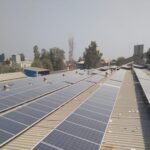India Solar Energy Policies: Key Updates and Government Initiatives
India Solar Energy Policies: Key Updates and Government Initiatives
India is one of the leading countries in terms of solar energy development, having become the fastest-growing market for solar power globally. India’s solar energy capacity has more than quadrupled in the past five years, increasing from 13,114 MW in 2017 to 57,705 MW in 2022.
India has an ambitious target to achieve Net Zero Emissions by 2070, in addition to attaining the short-term targets which include, Increasing renewables capacity to 500 GW by 2030.
To meet this goal, the government has introduced several policy initiatives and incentives such as increased financing, state initiatives, and tax benefits. These policies have helped to reduce the costs associated with solar energy projects, making them more attractive investments for both domestic and international investors. Furthermore, India’s strong technical know-how and its extensive infrastructure has enabled it to set new standards in solar energy production. As a result of these efforts, India is now a major exporter of solar energy, with most of its exports going to neighboring countries such as Bangladesh, Nepal and Sri Lanka.
Benefits of solar energy for India
1. Increased energy independence
Solar energy provides India with a source of renewable energy that can be used to reduce its dependence on fossil fuels and other imported resources.
2. Cost savings
Installing solar technology is becoming increasingly cost competitive in India with the decreasing prices of photovoltaic (PV) modules and other components.
3. Job creation
Solar energy projects in India are creating thousands of jobs, ranging from manufacturing to installation and maintenance.
4. Cleaner environment
By replacing traditional sources of power with solar energy, India can reduce its carbon emissions and help address climate change.
5. Improved access to electricity
Solar energy projects in rural areas are helping to fill the gap in access to electricity, providing clean and reliable power for people who don’t have access to traditional grids.
The government has introduced several policy initiatives and incentives that have helped to reduce costs, encourage adoption and attract investors towards solar energy.
Suggested Articles

China’s Solar Industry Poised for Continued Growth in 2023 and Beyond
China’s solar industry is set for continued growth in 2023 and beyond, driving global renewable energy expansion and technological advancements.

Solar Panel Selection Demystified: How to Choose the Right Panels for Solar Installation
Choosing the right solar panels can be confusing with so many options in the market. This guide simplifies solar panel selection by comparing types, efficiency ratings, and cost factors. Whether for your home, business, or industry, learn how to make an informed decision and maximize the return on your solar investment.

Haryana and UP Face Delays in Solar Net Metering Approvals
Net metering for rooftop solar in Haryana and Uttar Pradesh faces procedural delays, affecting solar adoption and efficiency for residential and commercial consumers

Delhi Government Pledges to Boost Renewable Energy Generation
Delhi, the capital city of India, is moving towards a greener future with an ambitious plan to generate an additional 6,000 MW of electricity using renewable energy sources.

Should You Replace Solar Panels with Solar Shingles?
Discover how solar batteries store excess energy, maximize your solar system’s efficiency, and provide reliable power during outages. Learn about the types, benefits, lifespan, and maintenance tips to make the most of your solar investment.

100 kW Solar Plant Cost in Rajasthan: Latest Cost, Maintenance & Payback Time
Installing a 100 kW solar plant in Rajasthan costs around ₹40–60 lakh in, with annual savings up to ₹10–12 lakh. Discover maintenance needs, ROI, and payback period of 4–6 years.

Why Go Solar: A Complete Guide to Solar Power for Homes and Industries
Switching to solar energy offers significant savings and environmental benefits. This guide explains why going solar is a smart choice, covering financial incentives, reduced electricity bills, and positive impacts on the planet.

How Quickly Can Solar Panels Pay for Themselves? Payback Period Explained
Learn how the solar panel payback period works, factors that affect ROI, and how soon you can recover your solar investment.